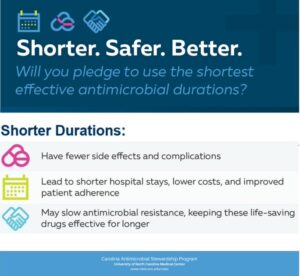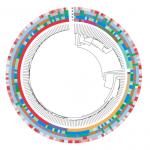Antimicrobial Resistance
 Take the pledge!
Take the pledge!
Imagine a world where prescribers everywhere used the shortest effective *evidence-based* antimicrobial durations. Better for patients, better for public health. Experts at UNC Medical Center’s Carolina Antimicrobial Stewardship Program have developed the “Shorter.Safer.Better” campaign to fight antimicrobial resistance.
Learn more and take the pledge
Antimicrobial resistance, or AMR, is a global health crisis that especially impacts the most vulnerable patient populations. AMR threatens advances made in all aspects of modern medicine including complex surgical procedures, transplantation, and cancer treatment. Annually in the United States, more than two million people become infected with antibiotic-resistant bacteria and more than 23,000 people die each year as a direct result of these infections (www.CDC.gov).
UNC researchers work to better understand AMR through basic science, translational research and clinical investigation.
CRACKLE
The Consortium on Resistance Against Carbapenems in Klebsiella and other Enterobacteriaceae — is led by David van Duin, MD, PhD. Since 2011, he has been conducting this prospective, observational, multi-center study that evaluates carbapenem-resistant Enterobacteriaceae (CRE) in hospitalized patients. CRACKLE is federally funded through the Antibacterial Resistance Leadership Group. After the completion of CRACKLE-1, which focused on the Great Lakes area in the US, he initiated CRACKLE-2, an expansion of the first study which covers more than 80 hospitals in 17 states in the US. In addition, international sites, including China and Colombia, are also enrolling patients into CRACKLE-2.
Learn More
- Antimicrobial resistance after burn injuries and severe skin disorders
- Antimicrobial stewardship (Carolina Antimicrobial Stewardship Program website)
- Carbapenemase-producing Enterobacteriaceae
- Mechanisms of antibiotic resistance in Staphylococcus aureus
-

Study finds three strains of resistant bacteria, identifying greater diversity
A new study by the Multi-Drug-Resistant Organism Network of the Antibacterial Resistance Leadership Group (ARLG) has found that strains of carbapenem-resistant enterobacterales (CRE), a major threat to vulnerable patient populations, are more diverse than previously thought. The MDRO Network is led by UNC Infectious Diseases investigator David van Duin, MD, PhD. Analyzing patient … Read more
-

Grant boosts antimicrobial resistance efforts in Malawi
The Institute for Global Health and Infectious Diseases and UNC Project-Malawi were awarded a $4.5 million grant by the UK’s Fleming Fund to strengthen Malawi’s One Health Antimicrobial Resistance (AMR) program. The grant will support the national AMR coordination committee and technical working groups, supporting ownership and alignment and scaling up a One Health AMR mentoring scheme. In the human … Read more
